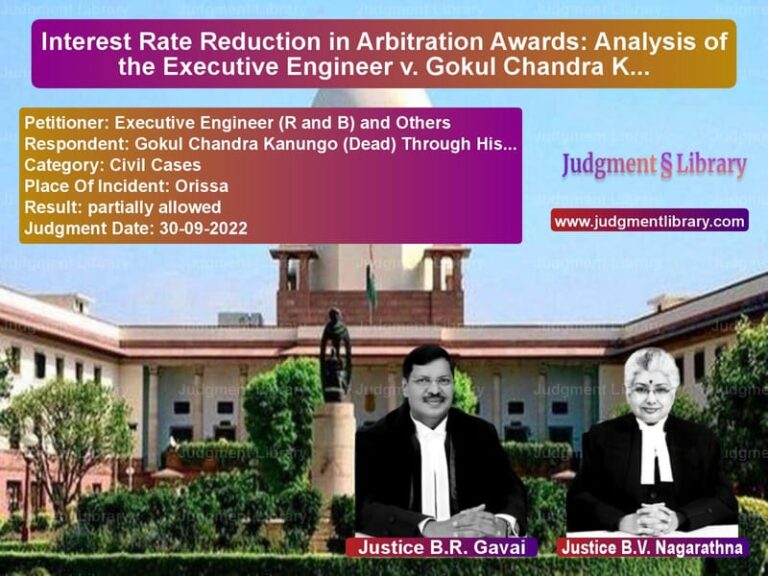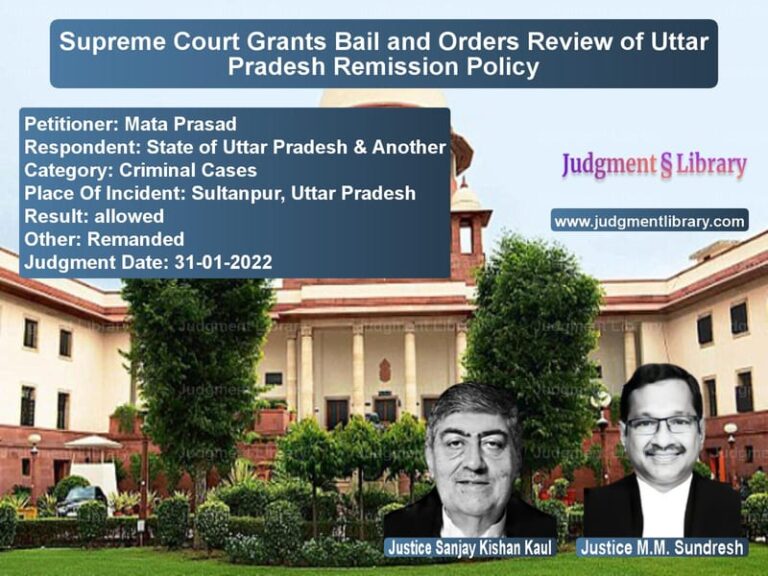Supreme Court Clarifies Mandatory Preliminary Enquiry in Corruption Cases: Karnataka vs Channakeshava Judgment
The Supreme Court of India recently delivered a significant judgment in the case of State of Karnataka vs Sri Channakeshava.H.D. & Anr., addressing the contentious issue of whether a preliminary enquiry is mandatory before registering an FIR in corruption cases under the Prevention of Corruption Act, 1988. The judgment, pronounced by Justices Sudhanshu Dhulia and K. Vinod Chandran on April 8, 2025, has far-reaching implications for how corruption cases are investigated in India.
Background of the Case
The case revolved around allegations against Sri Channakeshava.H.D., an Executive Engineer in the Bangalore Electricity Supply Corporation (BESCOM), who was accused of acquiring assets disproportionate to his known sources of income. The Karnataka Lokayukta registered an FIR against him under Section 13(1)(b) read with Section 13(2) of the Prevention of Corruption Act, 1988, based on a source report that alleged he had amassed wealth worth Rs. 6,64,67,000, which was 92.54% disproportionate to his income.
Arguments Before the Court
Petitioner’s (State of Karnataka) Arguments
The State of Karnataka, represented by senior advocate Mr. Devadatt Kamat, argued that the High Court erred in quashing the FIR. The State contended:
- The second proviso to Section 17 of the PC Act does not mandate a preliminary enquiry. It only requires the investigation to be conducted under the order of a Superintendent of Police (SP).
- The SP had passed an order for registration of the FIR based on a detailed source report dated October 5, 2023, which provided prima facie evidence of disproportionate assets.
- The Supreme Court in State of Karnataka v. T.N Sudhakar Reddy (2025 SCC OnLine SC 382) had held that a preliminary enquiry is not mandatory in every corruption case.
Respondent’s (Sri Channakeshava) Arguments
Senior advocate Mr. Ranjit Kumar, representing Sri Channakeshava, countered:
- The FIR was registered without giving the accused a chance to explain his position, violating the principles of natural justice.
- The SP had not conducted any preliminary enquiry before ordering the registration of the FIR, which was a violation of the second proviso to Section 17 of the PC Act.
- The FIR was being used as an instrument to harass the public servant.
Key Observations and Ruling of the Supreme Court
The Supreme Court meticulously analyzed the legal framework and precedents, including Lalita Kumari v. Government of Uttar Pradesh (2014) 2 SCC 1 and P. Sirajuddin v. State of Madras (1970) 1 SCC 595. The Court observed:
Read also: https://judgmentlibrary.com/supreme-court-revives-fraud-case-against-kia-parts-manufacturers-cfo/
“19. … The necessity of a preliminary inquiry depends on the specific facts and circumstances of each case. For instance, corruption cases fall into a category where a preliminary inquiry ‘may be made’.
20. The use of the term ‘may be made’ as noted in Lalita Kumari (supra) underscores that conducting such an inquiry is discretionary in nature and not a mandatory obligation.
21. Following the rationale of Lalita Kumari (supra), this Court in Managipet (supra) held that while the decision in Lalita Kumari (supra) noted that a preliminary inquiry was desirable in cases of alleged corruption, this does not vest a right in the accused to demand a preliminary inquiry.”
The Court further clarified:
“51. In view of the above discussion, we conclude that: b. The preliminary inquiry is not mandatory in every case under the PC Act. If a superior officer is in seisin of a source information report which is both detailed and well-reasoned and such that any reasonable person would be of the view that it prima facie discloses the commission of a cognizable offence, the preliminary inquiry may be avoided.”
Conclusion
The Supreme Court allowed the appeal filed by the State of Karnataka and set aside the High Court’s order quashing the FIR. The Court held that the SP’s order for registration of the FIR, based on the detailed source report, was sufficient compliance with the law. The judgment reinforces the discretionary nature of preliminary enquiries in corruption cases and underscores the importance of a balanced approach to prevent misuse of legal processes while ensuring accountability.
Petitioner Name: State of Karnataka.Respondent Name: Sri Channakeshava.H.D. & Anr..Judgment By: Justice Sudhanshu Dhulia, Justice K. Vinod Chandran.Place Of Incident: Bangalore.Judgment Date: 08-04-2025.Result: allowed.
Don’t miss out on the full details! Download the complete judgment in PDF format below and gain valuable insights instantly!
Download Judgment: state-of-karnataka-vs-sri-channakeshava.h.-supreme-court-of-india-judgment-dated-08-04-2025.pdf
Directly Download Judgment: Directly download this Judgment
See all petitions in Fraud and Forgery
See all petitions in Public Sector Employees
See all petitions in Disciplinary Proceedings
See all petitions in Judgment by Sudhanshu Dhulia
See all petitions in Judgment by K. Vinod Chandran
See all petitions in allowed
See all petitions in Quashed
See all petitions in supreme court of India judgments April 2025
See all petitions in 2025 judgments
See all posts in Criminal Cases Category
See all allowed petitions in Criminal Cases Category
See all Dismissed petitions in Criminal Cases Category
See all partially allowed petitions in Criminal Cases Category







